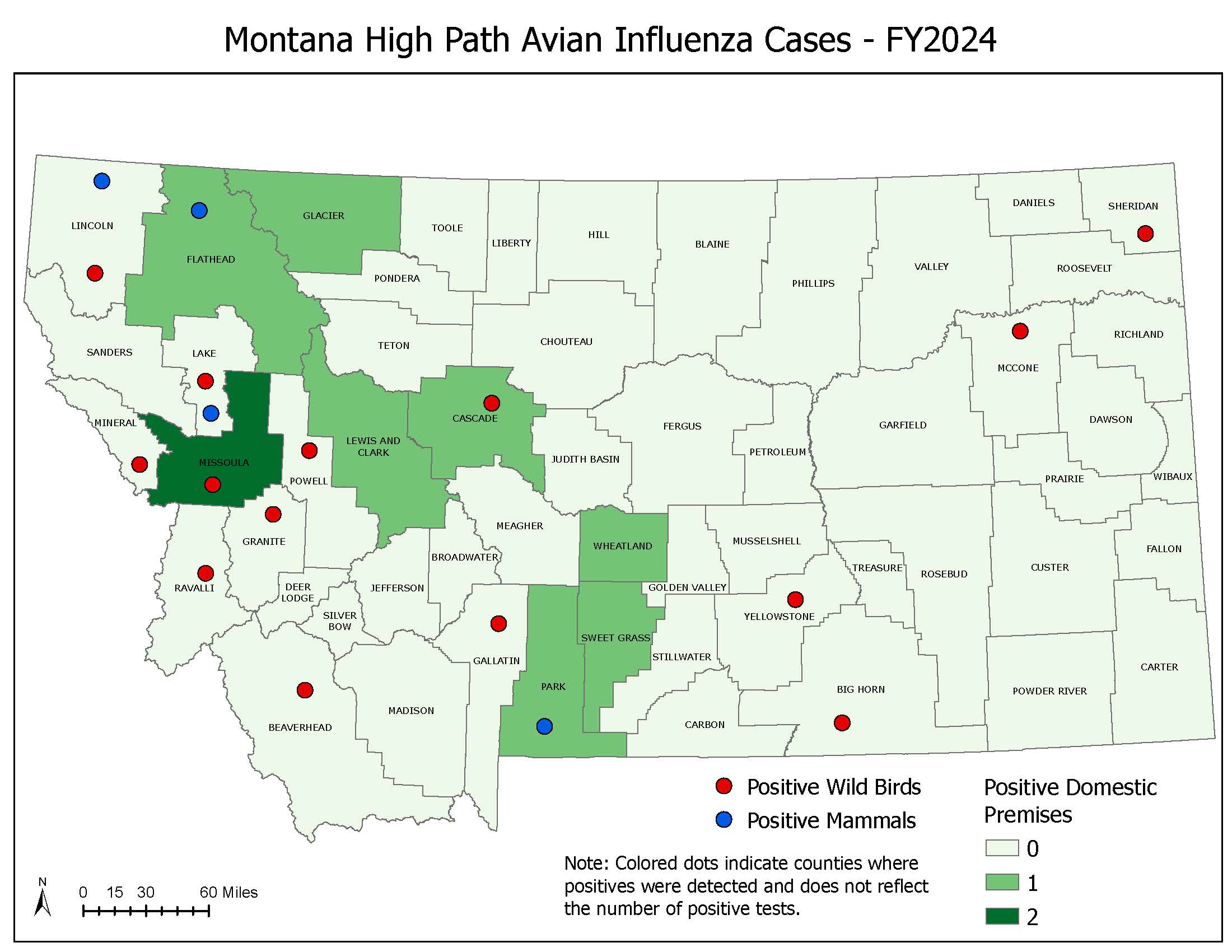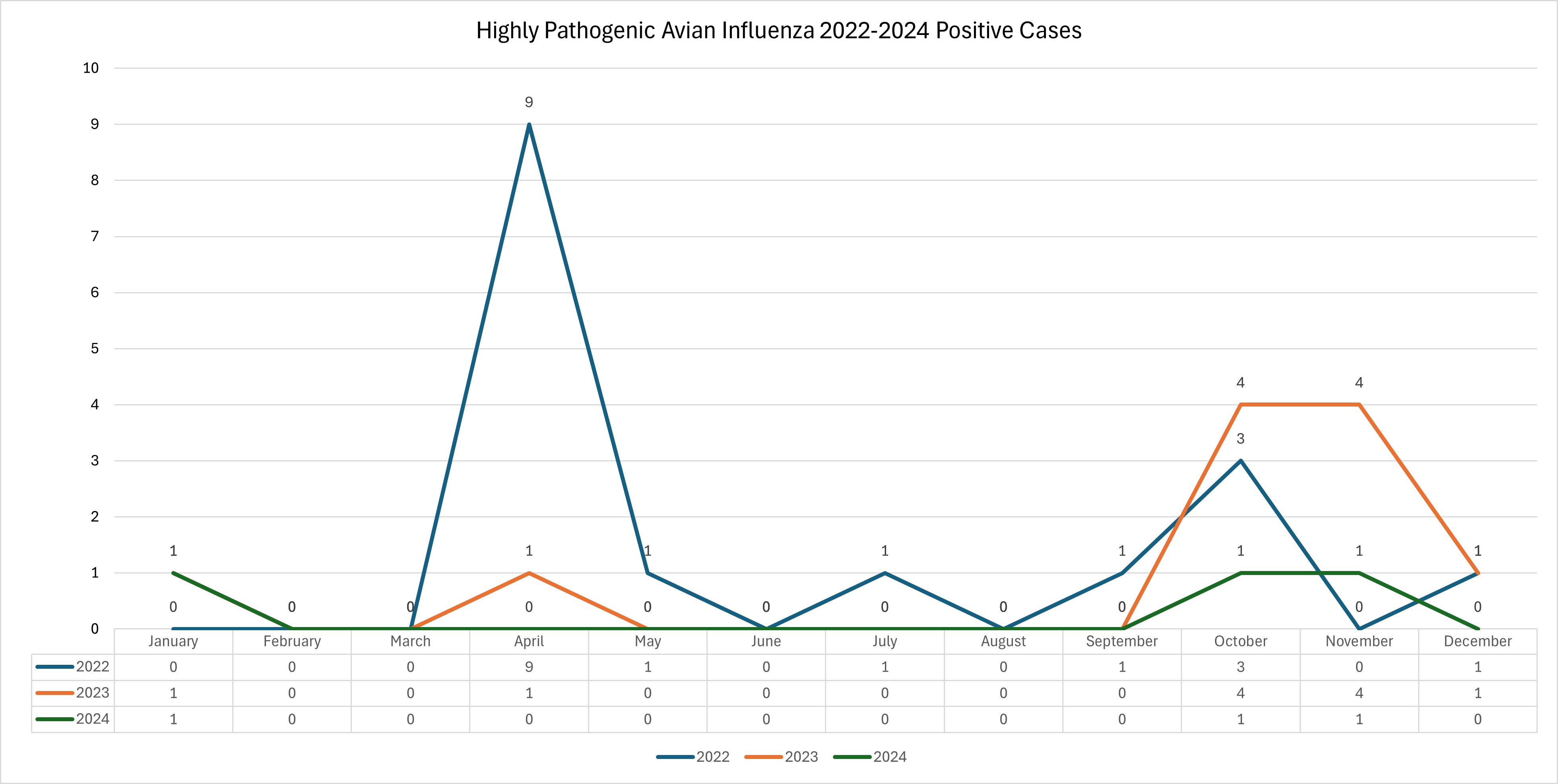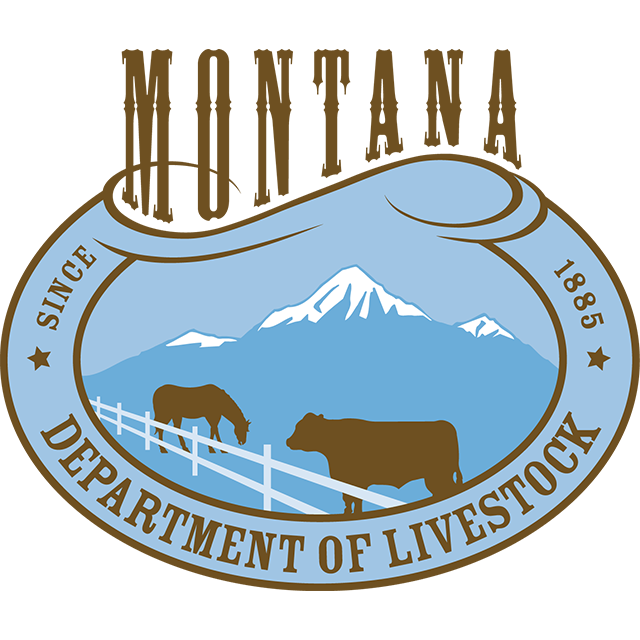
Here to serve the people of Montana and its livestock industry.
Animal Health Bureau
- Permits & Forms
- Brucellosis
- Brucella canis
- Feral Swine
- High Path Avian Influenza
- Johne's
- Rabies
- Trichomoniasis
- West Nile Virus
- National Poultry Improvement Program (NPIP)
- Pay for Permits Online
Helpful Links
Contact Information
Department of Livestock
Animal Health Bureau
PO Box 202001
Helena, MT 59620-2001
Email: livpermits@mt.gov
Highly Pathogenic Avian Influenza
Highly pathogenic avian influenza (HPAI) has been confirmed throughout the United States including several counties in Montana.
About Avian Influenza:
Highly pathogenic avian influenza (HPAI) is a highly contagious viral disease of chickens, turkeys, pheasants, quail, ducks, geese, guinea fowl, and many wild birds. It is transmitted by wild migratory waterfowl that may display no clinical signs of illness. Contact with infected birds, contaminated objects/equipment, and aerosol (short distances) can spread the virus which is found in feces, saliva, and respiratory secretions.
HPAI can cause high mortality in poultry and game birds; the first sign noticed in most cases is a high mortality rate with no prior clinical symptoms.
However, poultry affected by avian influenza can show:
- Decreased food consumption, huddling, depression, closed eyes.
- Respiratory signs, such as coughing and sneezing.
- Decreased egg production or misshapen eggs.
- Watery greenish diarrhea, excessive thirst.
- Swollen wattles and combs.
MDOL Official Orders regarding Avian Influenza and Media Releases
Avian Influenza Biosecurity Advisory Update (September 02, 2025)
Avian Influenza Biosecurity Advisory Update (February 04, 2025)
Avian Influenza Update and Biosecurity Advisory Update (October 03, 2024)
Avian Influenza Update and Biosecurity Advisory Update (June 07, 2024)
Avian Influenza Update and Biosecurity Advisory Update (September 20, 2023)
Additional Detections Avian Influenza Confirmed in Montana (December 19, 2022)
Avian Influenza Update and Biosecurity Advisory Update (August 31, 2022)
Avian Influenza Update and Biosecurity Advisory (March 3, 2022)
Prohibition of Poultry Shows, Exhibitions, Swaps, and Public Sales (Official Order No. 2022-01)
High Path Avian Influenza Testing Data
The map below represents Montana HPAI mammal and wild/domestic bird cases by county for Fiscal Year 2025 (7/1/2024 - 6/30/2025).
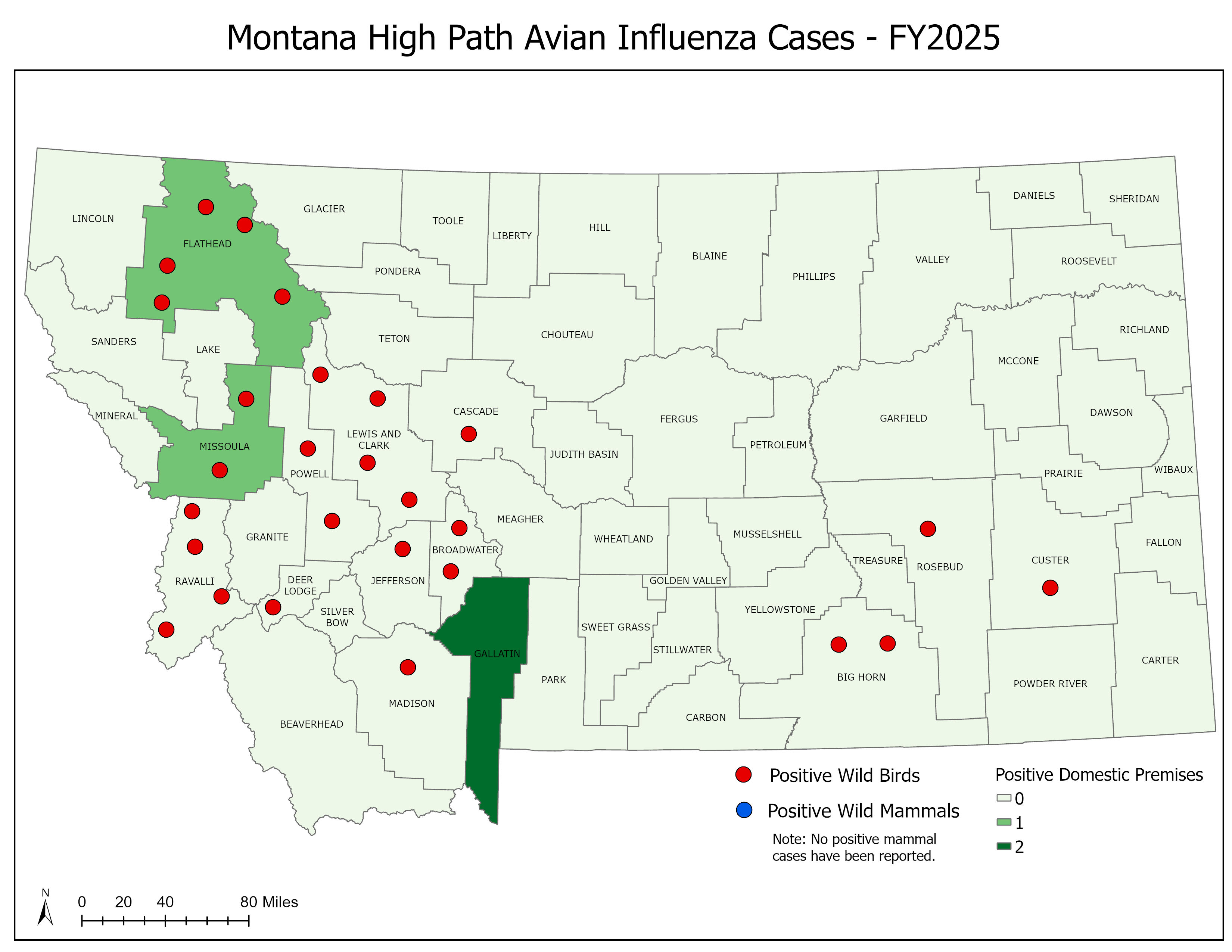
Historical High Path Avian Influenza Information:
Additional Information on High Path Avian Influenza (HPAI)
Background:
In January of 2022, highly pathogenic avian influenza (HPAI) was confirmed in wild birds in South Carolina, and in February the first case of HPAI in domestic poultry was confirmed in Indiana. Subsequently, HPAI has been confirmed in wild birds and poultry (backyard and commercial) in 47 US states and worldwide resulting in international trade restrictions on poultry and poultry products. Over 58 million birds from commercial and backyard poultry flocks have been affected. Montana’s first confirmed case was announced April 8, 2022. As of February 2023, Montana has had 16 positive flocks, resulting in over 82 thousand affected poultry.
Human Health Considerations:
The risk to human health associated with the current outbreak is low, according to the Centers for Disease Control (CDC) with no reported cases of human illness. It is safe to eat properly prepared poultry and poultry products. The United States Department of Agriculture (USDA) recommends that poultry and wild birds are cooked to a temperature of 165 °F.
Despite the low risk for transmission to humans, it is recommended to wear gloves and a face mask when cleaning dead wild birds or poultry from your premises. Thoroughly wash hands with soap and water after handling any birds. If you find dead wild birds on your property, please contact MT FWP for assistance with disposal 406-577-7880.
Other Animal Considerations:
HPAI has been confirmed in predatory mammals as well as birds of prey. Montana has reported HPAI in skunks, foxes, bobcats, coyotes, and bears. Mammals and birds of prey that become infected develop neurologic symptoms. The speculation for route of transmission in these species is an overwhelming exposure to the virus through ingestion of an infected bird.
The risk of HPAI transmission to domestic animals continues to be low. However, animals are at increased risk if they ingest infected domestic or wild birds or their bodily fluids. HPAI was confirmed in a stray kitten in MT. The kitten was found in the chicken coop of the HPAI infected premises in Missoula County. The kitten was taken to animal control who reported upper respiratory illness and abnormal neurologic symptoms (acutely blind, knuckling, ataxia). Given the rapid progression of neurologic signs, the kitten was humanely euthanized, tested negative for rabies, and tested positive for the strain of influenza that had infected the chickens on that site. Transmission in this case is assumed to be from ingestion of the manure and/or other organic material in the infected barn, which would have contained a high viral load of HPAI.
Stray or feral cats and dogs, hunting dogs, and outdoor only pets may be at increased risk given the possibility of finding and ingesting dead or sick birds. DOL recommends limiting pet exposure to domestic poultry and wild birds, especially if the birds are sick or dead. Safely clean any dead birds or bird products (eggs, feathers, feces) from premises as soon as possible. Learn more about HPAI in companion animals.
Biosecurity Measures:
Owners are encouraged to practice good biosecurity measures:
- Prevent contact between wild or migratory birds and domestic poultry, including access by wild birds to feed and water sources.
- House birds indoors to the extent possible to limit exposure to wild or migratory birds.
- Limit visitor access to areas where birds are housed.
- Use dedicated clothing and protective footwear when caring for domestic poultry.
- Wash and disinfect items going on and off your farm, such as footwear, vehicles, and equipment. Effective disinfectants include bleach, Comet bathroom cleanser, Lysol multi-purpose cleaner, Virkon, and Tek-Trol.
- Isolate sick animals and contact your veterinarian or Montana Department of Livestock (MDOL).
Who Can I Contact?
- If you see sickness or increased death loss in poultry, immediately contact MDOL at 406-444-2976.
- If you find sick or dead wild birds that have died from unknown causes, please contact your local FWP Warden, Biologist or Regional office, or call the FWP wildlife veterinarian at 406-577-7880.
More Information:
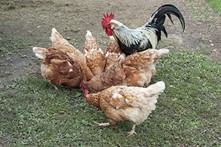 |
 |
|
Confirmations in Commercial and Source: USDA APHIS |
Detections in Wild Birds (2022) Source: USDA APHIS |
- Common FAQs
- Biosecurity - USDA - Defend the Flock Program
- Poultry Manual: Cleaning and Disinfection of Facilities, Equipment, and Vehicles
